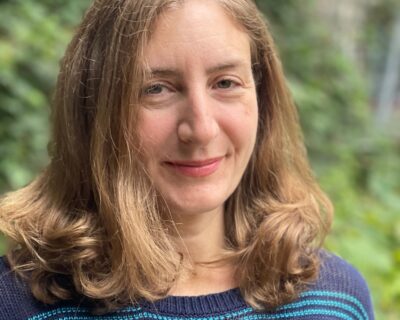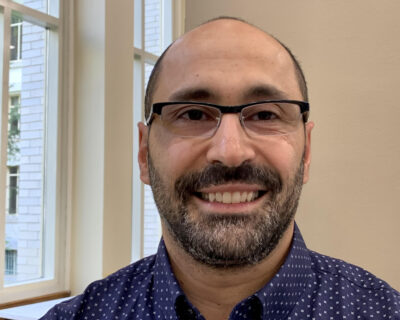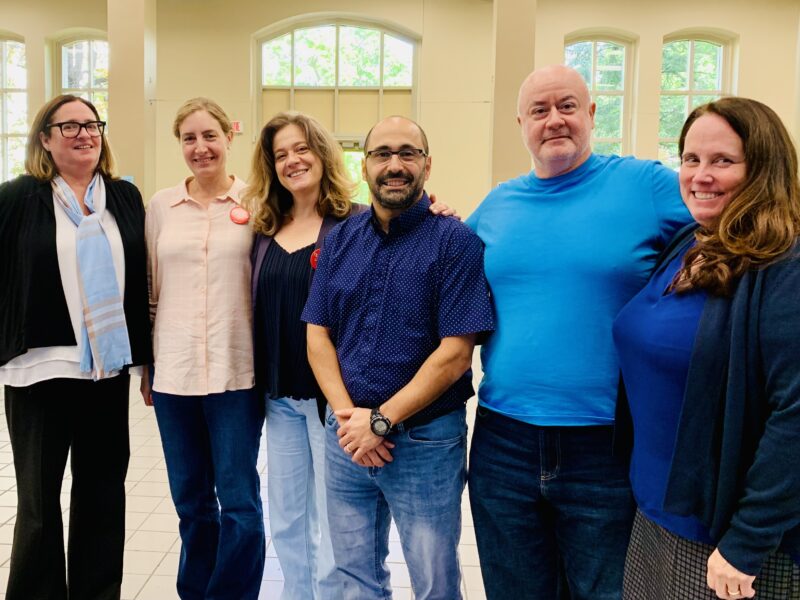Four teachers honoured with Teaching Excellence Award
Four outstanding teachers at Dawson received the Director General’s Teaching Excellence Award on the occasion of Ped Day on Oct. 13:
- Hannah Heath-Engel (Biomedical Laboratory Technology)
- Audrey Juhasz (Mathematics)
- Roger Machaalani (Chemistry)
- Nicola Martino (Italian).
Director General Diane Gauvin shared comments written by their students at the award presentation.
Hannah is “one of the best teachers a student could ask for,” has “a lot of knowledge and experience in the area she teaches” and “she is great at motivating students.”
Audrey is “the best calculus teacher I’ve ever had,” her “strength is her dedication to her students” and she “motivates students to have a good work ethic.”
Roger is “funny and engaging in every class,” “a clear communicator, and knows how to convey/explain the material well” and always shows up “motivated and excited, even to a class at the end of the day.”
Nicola is “without any hesitation the best teacher I have ever had,” “very passionate about his work and it shows when he teaches” and he “brings laughter into the classroom.”
Our 2023 cohort of excellent teachers shared their thoughts about teaching in a Q & A session:
Q & A with Hannah Heath-Engel

Tell me about your approach to teaching.
HHE: I do my best to keep the students engaged, and to use active learning strategies as much as possible. I also give a lot of feedback and guidance and try to make sure that my expectations are clear.
I am always willing to adjust my teaching if I find an approach that may work better: I am constantly learning from workshops, from my colleagues, and from the students. I am sure that I will keep learning and implementing new strategies and techniques for as long as I continue teaching!
How did you learn how to teach? And what led you to a career in teaching?
HHE: I started teaching when I was an undergraduate student, as a laboratory teaching assistant. It actually wasn’t something that I thought I would enjoy, and I was surprised by how fun and interesting I found it. I continued working as a teaching assistant through graduate school, and by the time that I graduated, I had started thinking about teaching as a career. I started teaching in the Biomedical Laboratory Technology Department as I was finishing my PhD, and I have been happily working here ever since!
Do you have any favourite teachers who influenced you? Please tell us about them.
HHE: I did an undergraduate degree in a small program at Toronto Metropolitan University (TMU), and the program size allowed teachers to give students a lot of support. I don’t know that I had a favourite teacher, but I really appreciated all of the teachers taking time to answer questions and provide support, and the overall sense of community and engagement within the program. I felt supported and listened to as a student, and all of the teachers seemed to be invested in the success of their students: as a teacher, I hope that I can provide the same support to my students.
Do you have Dawson colleagues or retired colleagues who have influenced you as a teacher?
HHE: All of my colleagues in the Biomedical Laboratory Technology Department have had an influence: I work with a group of amazing teachers and technologists, all of whom have given me advice, ideas and help. I have borrowed teaching strategies from everyone in the Department, and my overall approach to teaching and student support has been inspired by my colleagues. The Biomedical Laboratory Technology program is similar in size to my undergraduate program at TMU, and there is the same sense of community and investment in student success; something that I really enjoy and value!
What are the pedagogical styles you use and why do you think they are effective? Do you take part in any of the Dawson Communities of Practice (DALC, Interprofessional Education, etc)
HHE: Participation in the Writing in the Disciplines (WID) and Dawson Active Learning Community (DALC) communities of practice inspired me to start incorporating more active learning strategies in my classes: I now teach most of my classes in active learning classrooms, and incorporate active learning strategies into all of my courses. There is a lot of evidence showing that active learning works, and I find that active learning activities help students to engage with and better understand the course material.
I also think that is very important to provide frequent feedback, to ensure that students know what is expected of them, and to listen to student concerns and suggestions. I try to do all of these as much as possible!
How do you keep yourself motivated to be a great teacher?
HHE: The students! I get to see the same students from first year all the way to graduation: getting to know them and seeing them become more proficient and confident as they progress is a huge motivation, and I am always thrilled to see how happy and proud they are when they graduate!
Anything else you would like to share?
HHE: I have a BSc in Applied Chemistry and Biology from Toronto Metropolitan University, an MSc in Laboratory Medicine and Pathobiology from the University of Toronto, and a PhD in Biochemistry from McGill University. I was lucky enough to get a teaching position in the Biomedical Laboratory Technology Department at Dawson College in 2010, and I have been here ever since!
Q & A with Audrey Juhasz
Tell me about your approach to teaching.
AJ: I believe that CEGEP education is a right and not a privilege, and that drives the way that I teach. I aim to make the classroom a comfortable learning environment where students can ask questions. I also understand that there is a difference between what is being taught and what students are absorbing, so that I try to keep an open dialogue in order to gauge their understanding.
How did you learn how to teach? And what led you to a career in teaching?
AJ: I got into teaching accidentally. I had a degree in Mathematics and Philosophy from McGill, but I was more interested in business at the time, and I had started my own business after being awarded a bursary for young entrepreneurs. It was a great experience, but it wasn’t very profitable. I re-evaluated my ambitions as I started a family and enrolled in some graduate courses without a clear professional objective. I had an opportunity to teach math at high school, and although it wasn’t a profession I had considered in the past, I ended up loving it, especially teaching Calculus.
Do you have any favourite teachers who influenced you? Please tell us about them.
AJ: Yes! I have two that come to mind. Dr Galia Dafni (Concordia University) and Dr. George Haller (McGill University). What they both have in common is the ability to present complicated material in a very organized and clear manner, making it accessible. I remember how inspiring it was to be taught that way. They have influenced my teaching style.
Do you have Dawson colleagues or retired colleagues who have influenced you as a teacher?
AJ: I am surrounded by an amazing group of colleagues, and we are a great team. We all have different strengths, which we share with one another and ultimately with our students.
What are the pedagogical styles you use and why do you think they are effective? Do you take part in any of the Dawson Communities of Practice (DALC, Interprofessional Education, etc)
AJ: I do some exploration exercises and I allot as much time as I can to let students figure out problems on their own while in the classroom. I also give students opportunities to work out problems together as a team. I did take part in some of the DALC Seminars.
How do you keep yourself motivated to be a great teacher?
AJ: It’s very simple. It’s my job to make sure that students learn.
Anything else you would like to share?
AJ: I think I answered most of it above. I have a B.A. in Mathematics and Philosophy from McGill, and an MSc. in Mathematics from Concordia University. I did start in the Business department at Dawson, and I am technically part of both departments.
I do not favour students for their ability and their interest in mathematics (or lack of). I understand it is just a subject. As a student, I was interested in a great variety of subjects and it was very hard for me to decide on one area. I was torn between Fine Arts and Science. In CEGEP, I took as many fine arts electives as I could, as I love drawing and painting, and in my last semester of completing a DEC in Pure and Applied Science during the day, I attended Professional Photography school in the evening.
I preferred the structure of science education and started an undergrad in Chemistry, which I loved, but I was terrified of the labs, and that is how I ended up in Mathematics. I took a Philosophy class as an elective, and loved that area as well, so I ended up doing a double major. It was just as difficult to choose a career path (one summer I worked at the NFB painting snowflakes for an animated short) or to even pick a subject for grad school. I was first accepted into an M.B.A. and then to a Master’s of Architecture (I wanted to focus on the restoration of historic properties), but in the end I returned to mathematics.
Q & A with Roger Machaalani

Tell me about your approach to teaching.
RM: My teaching approach consists of four steps:
- I try to provide simple and clear class notes : This will help students understand complex topics in Chemistry.
- I try to integrate examples on how to solve Chemistry problemsin class: This will help students understand the theory.
- I try to provide examples on how Chemisry is applied in everyday life: This will help keep students interested in class and this also shows students that Chemistry is not just something that is found in a Chemistry book or on a piece of paper.
- I try to be available as much as possible to answer students’ questions: This will help students progress in their studies.
How did you learn how to teach? And what led you to a career in teaching?
RM: I learned to teach when I was a teaching assistant in Chemistry laboratories during my graduate studies (Master’s Degree) at the Université de Montréal.
Do you have any favourite teachers who influenced you? Please tell us about them.
RM: No, I do not have any favourite teachers who influenced me.
Do you have Dawson colleagues or retired colleagues who have influenced you as a teacher?
RM: No. I highly appreciate my teaching colleagues, but I cannot say that someone influenced me as a teacher.
What are the pedagogical styles you use and why do you think they are effective? Do you take part in any of the Dawson Communities of Practice (DALC, Interprofessional Education, etc)
RM: I did not take part in any of the Dawson Communities of Practice. I simply like to use a piece of chalk and a blackboard to teach my course.
How do you keep yourself motivated to be a great teacher?
RM: Chemistry can sometimes be complicated. Interacting with students and helping them to understand Chemistry is a big source of motivation for me.
Anything else you would like to share?
RM: I obtained my Bachelor’s Degree in Chemistry in 2002 at the Université de Montréal. After completing two industrial internships in pharmaceutical companies (Eisai Research Institute of Boston and Methylgene Inc.), I obtained my Master’s Degree in Chemistry (specialized in Organic Chemistry) in 2005, at the Université de Montréal, under the supervision of Prof. Stephen Hanessian. After finishing my studies, I worked for Methylgene Inc. for more than three years as a Research-Chemist in the Medicinal Chemistry Department. The Medicinal Chemistry Department’s task was to develop organic molecules to treat cancer.
Having enjoyed being a teaching assistant in the Chemistry laboratories during my graduate studies, I knew that one day I would become a Chemistry teacher. Since 2010, I have had the privilege to teach Chemistry at Dawson College, in a great working environment, with amazing colleagues.



